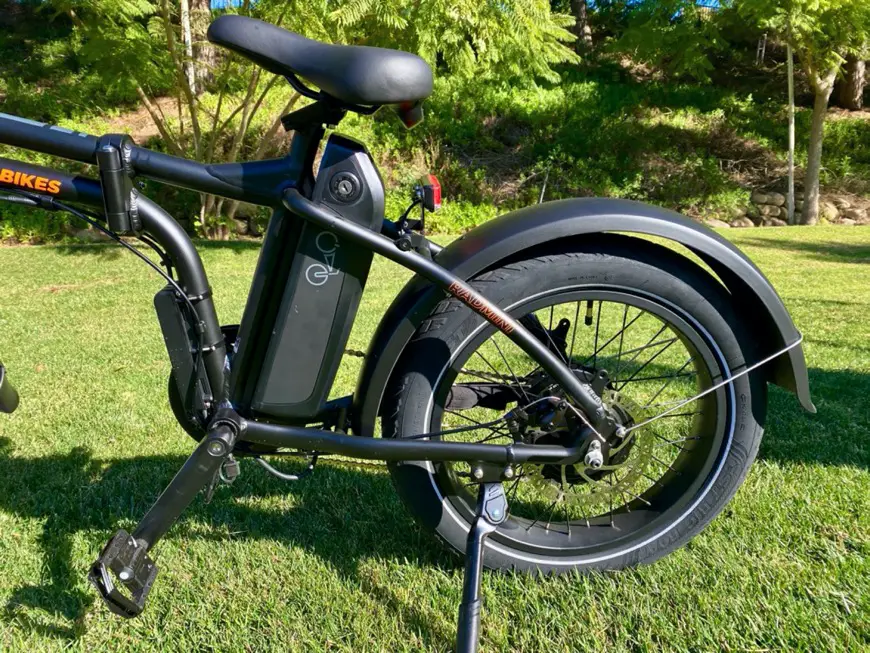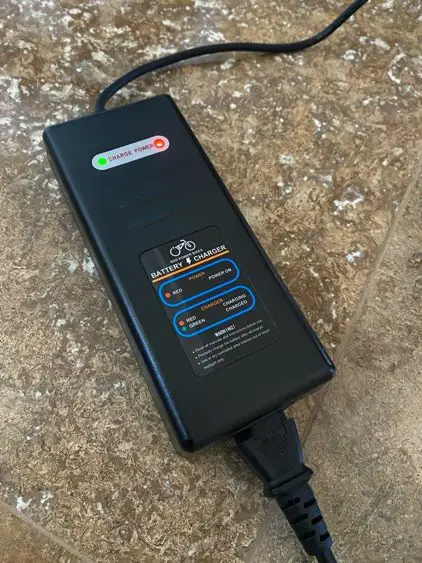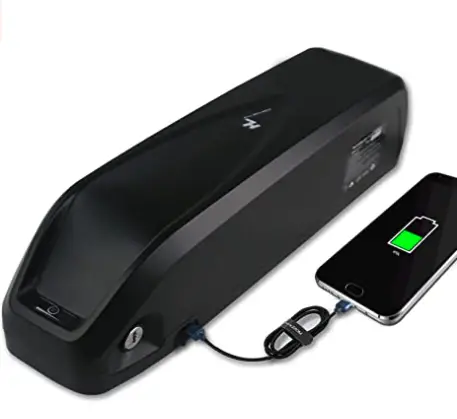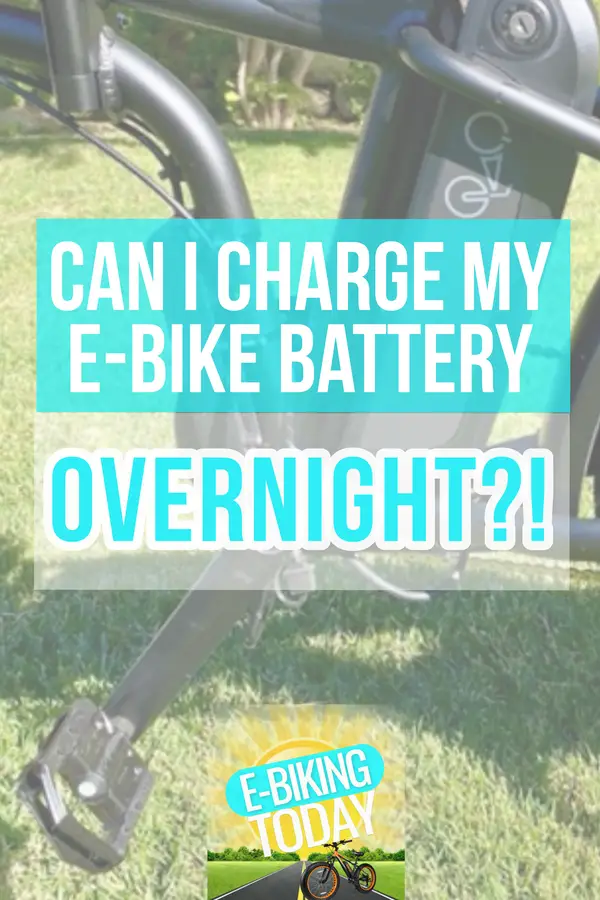Electric bike batteries are expensive to replace. In fact, they’re likely to be the most expensive part of your e-bike. So, naturally, you’ll want to make sure that you’re taking good care of your battery and that you’re safely maintaining it.
One of the things you may be wondering is whether it’s okay to charge your battery for a long period of time, such as overnight, and whether it’s safe to do so.
In general, you can charge your e-bike battery overnight and it’s safe to do so. However, there are several ways to properly maintain your battery so that you minimize risks.
Continue reading to find out what could be a problem with charging overnight and what you should never do with your e-bike battery.
Is it Bad to Charge Your E-Bike Battery Overnight?
It’s not bad to charge the battery overnight as long as you take good care of the battery and its charger.
Most newer electric bike batteries are designed to manage many hours of electric charging. They are so advanced, in fact, that they actually allow the battery to charge fully but know when to cut off the electric current. These smart batteries prevent overcharging automatically.
So there’s no reason that charging it overnight would be immediately harmful.
However, if the battery is not charged correctly or has been previously damaged, then overnight charging (or any lengthy charging) could be a bad thing.
Considering that the battery is the most expensive, and important, component of your electric bike, preventing battery damage should be at the top of your list anyway. So, I’ve listed a few things you should not do with your battery overnight.

Do’s and don’ts for overnight battery charging:
- Do use the correct charger (generally, the one that comes with your electric bike or battery purchase)
Don’t assume a charger fits your battery just because it looks like the same size. The right charger will have exactly the same voltage and amps (Watt-hours/wh) that your battery requires. For example, a 36-volt battery with 2 amps shouldn’t be attached to a charging station meant for 48-volt batteries with 5 amps.
Hint: If you share a household with another electric bike user, make sure to label your chargers like my husband and I do!
You may be able to charge it with a car battery and power inverter, generator, or even solar panels, but make sure you know how to do it correctly. - Do place your charger on a hard, non-flammable surface overnight
So, if by some slim chance it causes a spark, it won’t have anything to catch on fire. In other words, don’t leave it on the carpet or furniture. - Do charge your electric bike battery in a room with a temperature around 60 to 70 degrees Fahrenheit when charging it overnight (or for several hours unattended)
This is a charging tip you should follow whenever possible, as it’ll improve your battery life. Further, extreme heat or cold for several hours at a time could damage it.
- Don’t leave your battery plugged into power overnight too often
This could reduce the long-term life of your e-bike battery. In fact, most electric bike manufactures will recommend keeping your battery charged at around 80-90% for longer life. Thus, there’s no need to make sure your e-bike is fully charged every night.
Read here for 15 important battery charging tips for e-bikes.
Is It Safe to Leave a Battery Charger On Overnight?
A bigger concern about whether you can charge your e-bike battery overnight is your and your family’s safety.
You may have heard about lithium-ion batteries causing dangerous fires. And it certainly has happened… this is why you aren’t allowed to bring lithium-ion batteries onto an airplane (find out more about this in our electric bike travel guide).
Although there is little concern about fire with newer batteries, there are things you can do to keep your battery and your family safe.

What is safe for your e-bike battery
- It’s okay to keep your battery at a lower charge if you aren’t riding it regularly or it’s in storage.
Keeping it between 40% and 70% is fine. So, you don’t need to keep it fully charged to keep it in good shape, but you also shouldn’t let it discharge completely.
In other words, do not keep your battery plugged in night after night when you won’t be riding it. - However, if you ride frequently, you can keep your battery safely charged at 80%-90%.
There’s no need to keep the battery fully charged at 100%. So, you don’t really need to charge it overnight most times.
In fact, keeping it at 80%-90% will help you get the longest life possible. This could mean not having to replace your electric bike battery until it’s 5 or 6 years old, as opposed to only 3 or 4. - But, it’s also okay to fully charge your battery right before a long ride.
This is why you have an electric bike in the first place, right? … to ride it longer and farther! Your bike ride will be seriously disrupted if your battery dies while you’re riding it. So, go ahead and give it a 100% charge overnight.
How to prevent damage to your electric bike battery
There are several things you should never do with your electric bike battery. Doing these things could harm your battery, the charger, or yourself:
- Remove the battery from your electric bike once in a while during charging.
If you don’t, it’s possible that corrosion, dirt, or other gunk has built up between the connections to the bike and battery unknowingly. This may disrupt the battery connection and leave you without an e-bike to ride. - Avoid extreme temperature changes.
Below freezing temperatures or those above 110 degrees Fahrenheit will most certainly degrade your battery over time.
Although you can’t always avoid temperature changes while riding, you should only leave your battery on its charger in mild conditions (60-70 degrees Fahrenheit is optimal). - Don’t overcharge your e-bike battery!
Overcharging can lead to decreased battery performance over its lifetime. Keep reading below to learn more.
How Often Should I Charge My E-Bike Battery?
An electric bike battery needs to be charged regularly for optimal performance. However, there are no hard and fast rules on how often an e-bike battery should be charged.
Rather, it’s more important to consider at what percent you should keep your battery charged. If it has been fully charged to 100% once (which is recommended before riding it the first time), maintaining your battery charge at 80%-90% is generally a good idea.
Then give it another full charge occasionally or before you take off for a long day ride.

Don’t overcharge your battery
Overcharging your battery means you are keeping your electric bike charging up for days at a time, even when you aren’t riding it. This is completely different than just charging it overnight.
What happens here is that the battery will very slowly discharge over time. then it will start to recharge again. So, it misses full charging cycles completely, giving it only a small burst of volts.
This will wear down your battery much more quickly.
Additionally, you can overcharge a battery by recharging it every time it has drained from a short ride. If you take a ride and see that your battery has lost 5-10% of its charge, and you fully charge it and then do this repeatedly, you run the risk of overcharging.
Storing your electric bike with battery fully drained
Another way to quickly degrade your battery is by letting it completely drain and not recharging it. If you plan on storing your e-bike for a period of weeks or months, make sure you remove the battery from the bike.
Now, you can easily check and charge the battery occasionally. This will ensure a longer life and will keep your battery safe and well-maintained when you decide to ride your electric bike again.
Here are the best solutions for electric bike storage!
Conclusion: Can You Charge Your E-Bike Overnight Safely?
If you take good care of your battery and charger and follow the recommendations I’ve discussed above, then you can expect to safely charge your electric bike battery overnight.
Further, taking good care of your battery will prolong its life, minimize safety risks, and provide a reliable battery that’ll help you get where you need to go.
And, perhaps as an unexpected benefit of properly charging your e-bike battery, you’ll save money as well because you won’t have to replace it nearly as soon.



